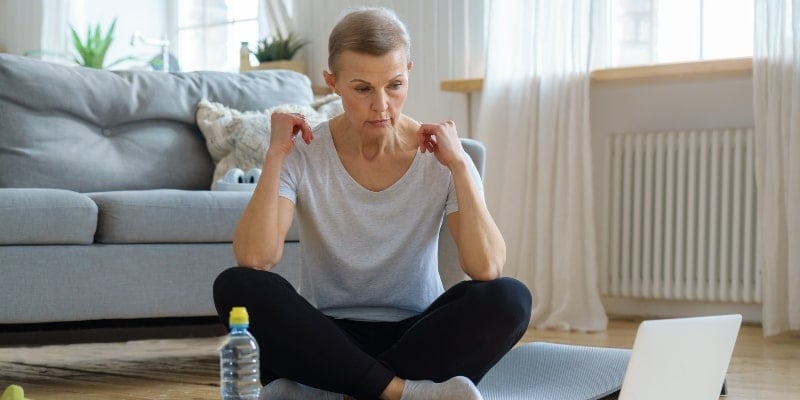Self care is an important topic in this day and age. As millions of people suffer from mental health complications, finding beneficial self care techniques is highly encouraged. Self care can help you manage stress, battle anxiety, and overcome depression.
While anyone can experience these issues, mental health problems can be especially troubling for seniors. Luckily, there are a few tips that can help.
Exercise
While exercising can help you look your best, it can also do wonders for senior mental health. Sometimes called “runner’s high,” this is when endorphins are released during or after a solid workout. However, you don’t have to be a serious runner or biker to reap these benefits. Do you enjoy swimming? Or how about dancing? All of these activities also release these endorphins, which can be very beneficial for your mental well-being. In fact, research indicates that physical exercise can lead to a decrease in anxiety and depressive symptoms. Furthermore, you can even release more endorphins by increasing the intensity of your workout. This can promote even more health benefits!
Stay Hydrated
While many people don’t realize it, staying hydrated has a massive impact on senior mental health. When our bodies don’t have enough water, they won’t function properly—and that includes your brain. If you’re dehydrated, you may feel sluggish, or you might have a terrible headache. In addition, low water intake can also decrease our mood. This is why it’s crucial to stay hydrated throughout the day. As an older adult, experts suggest drinking at least 1.7 liters of water per day. Not sure how much you drink? Try keeping a journal of your water intake, and be sure to increase it if needed.
Socialize
Do you enjoy socializing with others? If so, that’s great for senior mental health! After all, humans are social creatures, so we excel when we’re around others. That said, it’s no wonder why socializing has such a positive impact on our mental well-being. But that may be even more true for seniors.
While the elderly are more prone to social isolation, that can lead to several mental health problems. If you've recently experienced a decreased mood or depressive-like symptoms, it could involve your social life. Since seniors are more prone to social isolation, it’s important to keep an eye on how you're feeling. If face-to-face interaction isn’t possible, try utilizing social media to engage in conversation and socialize with others.
Experience the Outdoors
The power of nature is truly incredible. Even a quick walk in the sunshine can drastically improve your mood, which can be extremely beneficial for senior mental health. In fact, research shows that those who live near nature have reduced blood pressure, a lower heart rate, and even a decrease in stress levels. However, you don’t have to live in a rural area to experience these great benefits. Even a quick walk around your neighborhood or a bike ride through the park should do the trick.
Eat a Healthy Diet
As we age, eating a nutritious diet is essential. If not, you could experience a number of health problems—including depression, anxiety, and much more. While you may have difficulty finding and cooking the right meals for your health, here are some tips that can help:
- Focus on consuming enough protein, fruits, veggies, whole grains, low-fat dairy, and vitamin C
- Read nutrition labels and understand what they mean
- Drink enough water—it has nutrients too!
- Eat the recommended servings for your age
Eating a healthy diet can be a challenge, but following the tips above is a great start. If you’re cooking for a senior, do some research on the most beneficial foods for their specific age group.
Get Enough Sleep
As many seniors deal with chronic pain, this can make sleeping very problematic. Additionally, as people in this demographic often take medication, these can also lead to sleep issues. If you or a loved one is depressed, poor sleep could be the culprit. Just as it is for all adults, seniors are encouraged to sleep 7 to 9 hours every night. If seniors don’t get adequate sleep, it could lead to anxiety, irritability, memory issues, and an overall decline in senior mental health. To feel your best—both mentally and physically—getting the proper amount of sleep is highly recommended.
Don't be Afraid to Seek Help
Out of all of the self care tips for senior mental health, seeking help might just be the most important. While it’s estimated that around 20% of adults 55 years of age or older deal with some type of mental health complication, many of these people don’t seek treatment. But as more and more people are coming forward about their mental health problems, we can only hope this encourages seniors to get the treatment they need.
If you’re a senior struggling with depression, anxiety, or any other mental health concern, it’s important to understand that you’re not alone. As millions of people are experiencing similar feelings, therapists and doctors are here to help. Even if you’re just looking for someone to talk to, these professionals are here for you.
Caring for yourself should always be your top priority. While many seniors suffer from depression, anxiety, and other mental health concerns, you don’t have to be one of them.





